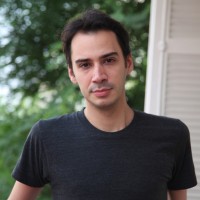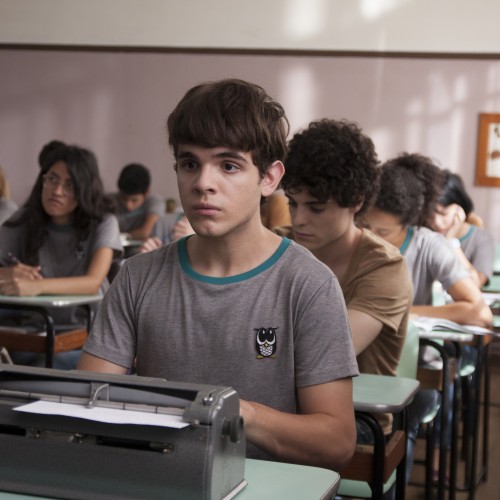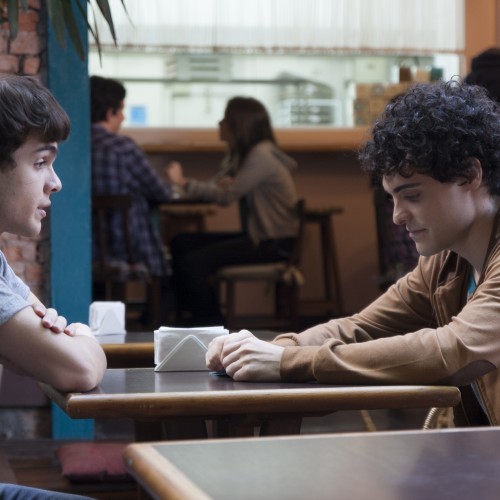Daniel Ribeiro’s Sweet Yet Substantial Debut
The word “sweet” has appeared in almost every description of Hoje Eu Quero Voltar Sozinho (The Way He Looks), the feature debut from Brazilian director Daniel Ribeiro. (He used it himself during our conversation.) That might be off-putting to some, especially when describing a coming-of-age story with a blind protagonist.
But Ribeiro’s film isn’t all sentimentality and charm. His main character, Leonardo (beautifully portrayed by Ghilherme Lobo), while very likeable, is also stubborn, as are most teens. He also happens to be gay, something he discovers when he falls in love for the first time, with the new boy at school (Fabio Audi). There’s also jealousy (via Leo’s best friend Giovana, played by Tess Amorim), bullying and parental friction, all handled with admirable restraint.
The movie is a poignant, low-key drama from a filmmaker who describes himself as an activist. His first short was 2007’s Café com Leite (You, Me and Him); The Way He Looks is an elaboration on his 2010 short Eu Não Quero Voltar Sozinho (I Don’t Want to Go Back Alone) — which also starred Lobo, Audi and Amorim. Recently I spoke via Skype with Ribeiro, who was in his hometown of São Paulo, taking a break from his travels for international screenings and promotional duties.
Your film opened in April in Brazil and has been screening all over the world; do you get the same sort of feedback from people everywhere?
Yeah, it’s interesting; the reaction is usually the same, because it is such a universal story. No matter if you’re in Tokyo, Sidney or Colombia; falling in love for the first time, being excited about a first kiss, it’s usually universal in the human experience.
Then there’s the gay component, which is also universal. Were there any countries where the response to that aspect was different?
Homosexuality in the film is treated in such a sweet and delicate way, I never got a weird response about that; it was always very, very positive. Though I didn’t go to any countries where that would be a problem. For example, the film’s going to be screened in Russia in November. I really want to go but won’t be able to. I’m excited about that screening. The film works really well for gay people because they see it in a way as empowering, a character who is very confident about his sexuality and very proud of who he is. And it treats sexuality in such a natural way — it’s about first love, first kiss — so that straight audiences can relate to the gay character. So it’s good for both audiences. When I made it, I hoped that would happen.
The Way He Looks was submitted as Brazil’s entry for the Best Foreign Language Academy Award. When did you find out?
I think it was in mid-September; I was in Australia, so I was on the opposite side of the world; literally 12 hours difference. They announced it in the morning; I was going to sleep there, so it was crazy to be alone celebrating. It was really exciting because it is an independent film with a gay, blind character. We were very happy to see Brazil chose that film to represent the country.
It says something about your country…
Yes, because in Brazil we’ve been having a lot of problems with homophobia, gay violence. We just had an election and the issue was really big, so I think having the film chosen is a statement, saying that we’re a country that respects diversity, we cannot go back in time; we’re going forward.
You went to film school at University of São Paulo; were you always fascinated by movies?
Not exactly; I was always interested in communication, in telling stories. When I was deciding which school to go to, I thought film would be an interesting way to express what I want to express. Creating fictional stories is a way for people to relate to characters who are different from who they are. Film was a way for me to do what I want to do, but I think I’m more of an activist in a way. I use films to discuss issues that I think are important.
When you made the short I Don’t Want to Go Back Alone, were you already thinking about a feature?
Yeah, the idea that came first was the discovery of sexuality, because some people say that gay sexuality is a choice, but we say that we are born like this. So I thought that the blind character would be a perfect way to portray that. He’s a kid who has never seen a guy or a girl and he falls in love with a guy. I thought that was an interesting way for people to understand that it is something very natural happening to him. I wanted that complex character to be my first feature. I thought it would be good to do another short, to experiment and also to help funding. When I first told people the idea,” I want to do a film about a blind teenager who discovers that he is gay,” a lot of them said, “Oh my god, that’s just a tragic story, so terrible.” And I was like, “No, it’s not.” So doing the short was a way to show how I saw it.
The actors in the short worked out so well, you used them in the feature too.
Yeah, I think casting is the most important thing in the film. I was obsessed with that. We actually found Ghilherme Lobo very quickly, then we found Tess and they had great chemistry. Then we had a bit of a hard time finding the third actor because Ghilherme was very young and we couldn’t find someone as good and as young as he was. Then when we found Fabio, I thought this is perfect; they’re a believable trio. When we did the feature, they hadn’t grown up too much, I still could use them.
It sounds like it was a good experience all-around.
It was; everyone working on the film was very excited. The actors and the crew. It was my first film, the producer’s first film, the art director and cinematographer’s first feature film, the editor’s first film, so we had a crew that was very excited, in a very good mood to work, and I think that is reflected in the final result.
Are you working on any new projects?
I have some ideas but I’ve been having a hard time writing…You need time and you need your mind to be fresh, and my mind is still very concentrated on this film. But I have some ideas. I want to continuing working with stories with gay characters; I think it’s very important.
Do you have any dream projects or collaborators?
No, I usually take one step at a time; I don’t make big plans, I don’t have big dreams like that. I think it’s important to know the size of what you can do. I just have the stories I want to tell. And I think that is a good way to always be surprised. I want to tell the stories I want to tell and that’s it. And whatever comes — great collaborators, etc. — I’m open to that, too.
The Way He Looks is playing at Village East Cinema, 189 Second Avenue at 12th Street.
—Marina Zogbi




